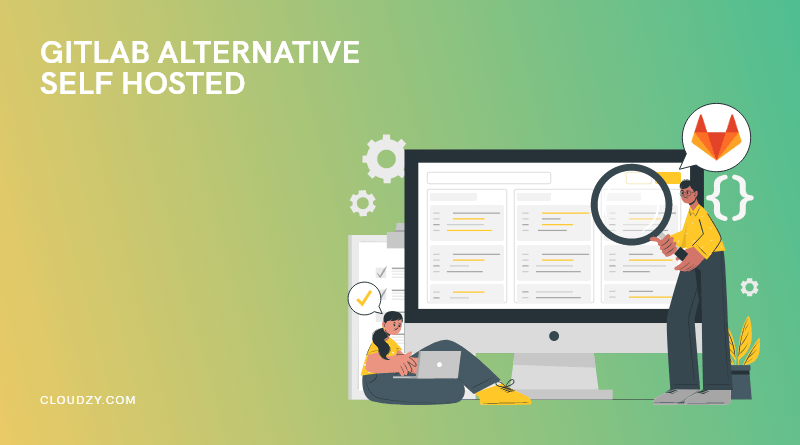Git is a distributed version control system (DVCS) for tracking changes in computer files and coordinating work on those files among multiple people. Git is designed for collaborative software development, but it can be used to track changes to any set of files.
It was created by Linus Torvalds in 2005 after he wrote the first version of Git as a tool to help manage the development of the Linux kernel.
GitLab is a software development platform for Git. It is a web-based git repository manager with wiki and issue tracking features. GitLab offers flexibility, scalability, and ease of use. It also includes features for tracking issues, code reviews, and collaboration among team members. The great thing about GitLab is that it is a free and open-source DevOps platform. GitLab Community Edition (CE) is licensed under the terms of the MIT License. GitLab Enterprise Edition (EE) is licensed under “The GitLab Enterprise Edition (EE) license” wherein there are more restrictions.
Although it is similar to GitHub, GitLab offers a few features that are not available on GitHub. For example, GitLab has a built-in CI/CD pipeline, which allows you to build, test, and deploy your code directly from GitLab. Additionally, GitLab offers more integration options than GitHub. For example, you can integrate GitLab with Jira, Bitbucket, and other tools.
However, GitLab is not the only option for managing Git repositories. There are several other self-hosted and open-source DevOps platforms available that may be a better fit for your organization.
It can be difficult to decide which platform to use, so it is important to compare the different features and decide which one is best for your needs. In this article, we will get to know some of the most popular GitLab alternative self-hosted platforms as well as some of the top open-source DevOps tools.
- Comparing GitLab Alternative Open-Source DevOps Tools and GitLab Alternative Self-Hosted
- When to Choose a GitLab Alternative Self-Hosted or Open-Source DevOps Tools?
- What Factors Do I Need to Consider When Choosing a GitLab Alternative Self-Hosted or Open-Source DevOps Tools?
- Best GitLab Alternatives Self-Hosted and Open-Source
- Conclusion
Comparing GitLab Alternative Open-Source DevOps Tools and GitLab Alternative Self-Hosted
GitLab is a fairly popular piece of software for version control and code management. It’s often used in conjunction with DevOps, which is a term for practices that help make the process of software development and delivery more efficient. There are alternatives to GitLab, some of which are open source and some of which are self-hosted platforms.
To see which alternative should we choose, let’s go through each alternative’s definition, and its advantages and disadvantages.
GitLab Alternative Open-Source DevOps Tools
DevOps is a software development approach that emphasizes communication, collaboration, and integration between software developers and system administrators. In a world where DevOps is becoming more and more important, many organizations are looking for an alternative to the dominant GitLab platform.
Here are three reasons why you should consider using an open-source DevOps platform over a GitLab alternative self-hosted:
- DevOps platforms are faster: They can handle larger deployments much faster than GitLab alternative self-hosted platforms, making it a better choice for organizations with high-volume web applications.
- DevOps provide you with so many features: You can also improve the quality of your software development process.
- Additionally, the company’s developers can have more input into the development of the product. So, using an alternative GitLab DevOps can help a company become more agile and innovative.
However, using a GitLab alternative open-source DevOps can be complicated for new users to learn. They probably will not know how to use all the features. This can lead to missed opportunities for collaboration and code review.
Moreover, it is not always affordable. The platform can be expensive for smaller organizations that don’t need all of the features that GitLab alternative open-source DevOps offers.
GitLab Alternative Self-Hosted
If GitLab is a self-hosted service, it means you can install it on your own server. This makes it an excellent alternative to GitHub and Bitbucket for organizations that want more control over their data.
When it comes to choosing a GitLab alternative, self-hosted options are definitely worth considering. There are many great benefits to opting for a GitLab alternative self-hosted service rather than choosing a GitLab open-source DevOps.
- Having more security and control over your data is the first advantage of using a GitLab alternative self-hosted platform. You can use any database or programming language you want, and there are no restrictions on scalability. You can also customize your security settings to meet your specific needs.
- Additionally, self-hosting can be more cost-effective in the long run, especially if you have the technical expertise to manage the software yourself.
- Finally, if you’re looking for more flexibility, customizability, and control over your GitLab instance, a self-hosted solution is likely the best option for you.
Nevertheless, there are a few disadvantages to using a GitLab alternative self-hosted service. Perhaps the biggest downside is that you have to maintain and manage the software yourself. This can be a time-consuming and complicated process, especially for those who are not familiar with coding or development.
In addition, if something goes wrong with your self-hosted GitLab installation, you will likely be the one responsible for fixing it.
When to Choose a GitLab Alternative Self-Hosted or Open-Source DevOps Tools?
Although GitLab has a variety of features, including issue tracking, wiki, and continuous integration, there may be times when you need to use an alternative to GitLab.
One reason for choosing a GitLab alternative self-hosted or open-source DevOps service is if GitLab is unavailable or it is experiencing technical difficulties. If GitLab is down for an extended period of time, you’ll need an alternative to continue your work.
In some cases, the project may be too complex or large for GitLab to handle. In that case, a GitLab alternative self-hosted platform or a GitLab open-source DevOps solution such as Bitbucket and GitHub may be more appropriate.
Another reason is if GitLab doesn’t meet your needs. If you require additional features that GitLab doesn’t offer, you’ll need to look for an alternative platform.
All in all, if you are unhappy with GitLab’s features or performance, you may need to use a GitLab alternative self-hosted platform or an open-source DevOps.
What Factors Do I Need to Consider When Choosing a GitLab Alternative Self-Hosted or Open-Source DevOps Tools?
There are many GitLab alternatives that can be used to manage your codebase without relying on the cloud. Each of these solutions has its own advantages and disadvantages, so it’s important to choose the one that is best suited for your needs. Here are some factors to consider when choosing an alternative for GitLab :
One of the most critical factors in choosing a GitLab alternative self-hosted or open-source DevOps is the size of your team. If you have a small team, then a self-hosted solution like Bitbucket may be a better fit for you. If you have a large team, however, then you may want to consider a GitLab open-source DevOps like GitLab that can accommodate more users and is easy to scale up and down.
Another essential factor to consider is your budget. Some self-hosted solutions can be expensive, while open-source DevOps solutions can be free. Make sure to compare the pricing plans of different platforms before making a decision.
Another important factor in choosing a self-hosted or open-source alternative to GitHub/GitLab is support. Make sure that there is a good community or support team behind the software in case you run into any problems.
Finally, when choosing a GitLab alternative self-hosted or open-source DevOps service, you need to think about your needs and requirements. What features do you need in a GitLab alternative? What is your development process like? Answer these questions and more before making a decision. You need to make sure the software has all the features you need. Otherwise, you may find yourself having to switch again in the future.
Best GitLab Alternatives Self-Hosted and Open-Source
If you’re looking for a GitLab alternative, there are a few self-hosted and open-source options to choose from. Here are some of the best ones:
GitHub is the most popular and among the best GitLab alternative open-source options. It’s a web-based code hosting platform where developers can share their work, collaborate, and build software. It has a massive following and also has some features that GitLab lacks, such as issue boards and milestones. Plus, it’s very easy to set up and use.
GitHub offers both paid and free plans for users. The paid plans offer more features, such as private repositories and more storage space.
Although GitHub is a service that is based on closed source, it is free for open-source projects and has basically improved open-source collaboration.
Bitbucket Server is another popular GitLab alternative self-hosted and open-source service. It is a code hosting platform that is popular among developers and offers all of the same features as GitLab, plus a few extra goodies, like unlimited private repositories. It is even more user-friendly than GitLab.
If you’re already using Bitbucket, there’s no need to switch to GitLab! You can keep using Bitbucket and still enjoy the benefits of GitLab’s powerful features. It has Wikis and a code review service. Also, it comes with perfect integration with other Atlassian software like Jira, Trello, and Crowd.
Bitbucket Server is great for teams that need to host their own repositories.
RhodeCode, created by Marcin Kuzminski in 2010, is a web-based free and open-source GitLab management alternative. RhodeCode enables developers to manage their Git repositories, advanced code reviews, and deployments from a single platform. The software also includes features for managing team collaboration and permissions.
RhodeCode may be an excellent alternative to GitLab, as it is less expensive than GitLab, and it has many of the same features as GitLab. In addition, RhodeCode can be hosted on-premises or in the cloud, and its dedicated domain provides you with SSL security.
SourceForge is a web-based platform for software developers to collaborate on code.
It may not be a GitLab alternative self-hosted platform but is entirely free to open-source projects.
It offers a code hosting and collaboration tool that is an alternative to GitLab. Developers can use SourceForge to host their code, manage projects, and collaborate with others. It also includes services such as bug tracking, user support forms, user mailing list, and wiki documentation.
You can also discover and buy new business software on the platform.
If you’re looking for a GitLab alternative self-hosted platform, Gitea is definitely worth checking out.
Gitea is a GitLab and GitHub self-hosted alternative that offers many of the same features as them. It’s a great alternative if you are looking for a cheaper or self-hosted option. Like GitLab, Gitea supports Issue tracking, code reviews, and merge requests. Additionally, Gitea has a thriving community and offers many plugins to extend its functionality.
It is also fast and reliable and integrates well with other services such as Travis CI and Heroku.
Gitea also has an open-source version which is based on Go and was launched in October 2016, when some developers forked Gogs, the older self-hosted Git service. This project can be used on all Go-supported platforms such as Linux and Windows.
Gogs is a self-hosted GitLab alternative written in Go. If you are looking for a self-hosted alternative to GitHub, Gogs would be a perfect choice. It’s designed for small businesses and individual developers who want to host their own code repositories without relying on a third party. Gogs is stable, fast, efficient, and easy to set up and use. It also integrates well with other tools like Travis CI and Jenkins.
This entirely free-of-charge system has many of the same features as GitLab and also has its open-source version of the platform.
Gogs can be run on several operating systems such as Linux, Mac, and Windows; therefore, it can be one of the best GitLab alternative self-hosted platforms.
Azure DevOps is an excellent GitLab alternative for several reasons:
Azure DevOps is a comprehensive Git-based platform for software development and delivery. It offers a suite of features to support the entire software development lifecycle, from planning and development to release and operations. Azure DevOps can be used as a GitLab alternative or in addition to GitLab.
Azure DevOps is free for small and open source projects and is very affordable for larger teams, making it an excellent value.
It also offers a great set of features. It includes everything you need to manage your development projects, including version control, bug tracking, and release management.
Moreover, Azure DevOps is easy to use. It’s based on the popular Visual Studio IDE, so you’ll be familiar with the interface right away.
Azure DevOps is not available for GitLab alternative self-hosted solution.
Wekan is a web-based Kanban board that can be used as a GitLab alternative self-hosted. Wekan is easy to use and is perfect for smaller teams who don’t need all the features that GitLab offers. It’s also great for solo developers who want an easy way to track their work.
Waken offers several features that are not available in GitLab, such as the ability to create unlimited boards, cards, and users. Additionally, Wekan translates several languages and lets multi-users run it at the same time.
If you’re looking for a self-hosted GitHub alternative, Wekan is definitely worth checking out.
If you’re looking for a GitLab alternative self-hosted and open-source, Buddy is a great option. It’s a cloud-based platform that makes it easy to collaborate on projects with your team. You may host Buddy in cloud, or install it on your own server.
You can create and manage repositories, track issues, and collaborate on code. Plus, Buddy offers powerful automation tools that make it easy to automate your workflow.
Buddy supports several systems such as Laravel, PHP, Node.js, Ruby, Gulp/Grunt, Python, Go, and Java.
Newfang Cloud is a viable GitLab alternative self-hosted that offers many of the same features and benefits.
One of the most significant advantages of Newfang Cloud is its price. It is significantly less expensive than GitLab, making it an attractive option for smaller teams or budget-minded organizations.
Newfang Cloud is also user-friendly and has a simplified user interface that makes it easy to get started quickly.
Another key benefit of Newfang Cloud is its support for multiple languages. This makes it an ideal choice for development teams with members located around the world. This GitLab alternative self-hosted platform is also compatible with servers such as Mac, Linux, and Windows.
| Brands | Super Power |
| GitHub |
Issue boards and milestones
|
| Bitbucket |
Unlimited private repositories
|
| RhodeCode |
On-premises or in the cloud hosting
|
| Sourceforge |
Bug tracking services
|
| Gitea |
Offers many plugins to extend its functionality
|
| Gogs |
Fabulous integrations with Travis CI and Jenkins
|
| Azure DevOps |
Based on the popular Visual Studio IDE
|
| Waken |
Unlimited boards, cards, and users
|
| Buddy |
Powerful automation tools
|
| Newfang Cloud | User-friendly |
 A VPS with no limitation
A VPS with no limitation
Get a Python VPS to easily reach its full potential and a high-performance, low latency server that you can use to develop, test, and, most significantly, deploy Python web apps.
Go for Python VPSConclusion
In conclusion, GitLab is a great option for software development and source control, and the most popular alternative for it is GitHub. But they may not be the best option for every individual or organization.
If you’re looking for GitHub or GitLab alternative self-hosted or open-source platform, there are a number of excellent alternatives available. Bitbucket is also another great popular option, that offers free plans for small teams.
Read this blog to see other possible alternatives. Each service provides similar features to GitLab, and has its own advantages and disadvantages. So, it’s crucial to evaluate each option and set your needs before making a decision to choose the option that is best for you.
Note that you can also install GitLab alternative self-hosted on your server or VPS. However, it is important that you buy VPS that is safe, reliable, and secure. You should also ensure that your VPS is built on top-tier infrastructure; therefore, it can provide you with high performance. This is where Cloudzy’s affordable VPS comes into play. You can buy VPS at the price of two burgers while enjoying the best quality on the market! Contact us to learn more.







2 thoughts on “Best Self-Hosted GitLab Alternative 2022 : Top Must-Have Open-Source Devops Tools”
Way cool! Some very valid points! I appreciate you writing this article and
the rest of the site is also very good.
Remarkable issues here. I am very glad to look your post.
Thanks a lot and I am having a look forward to touch you.
Will you please drop me a mail?